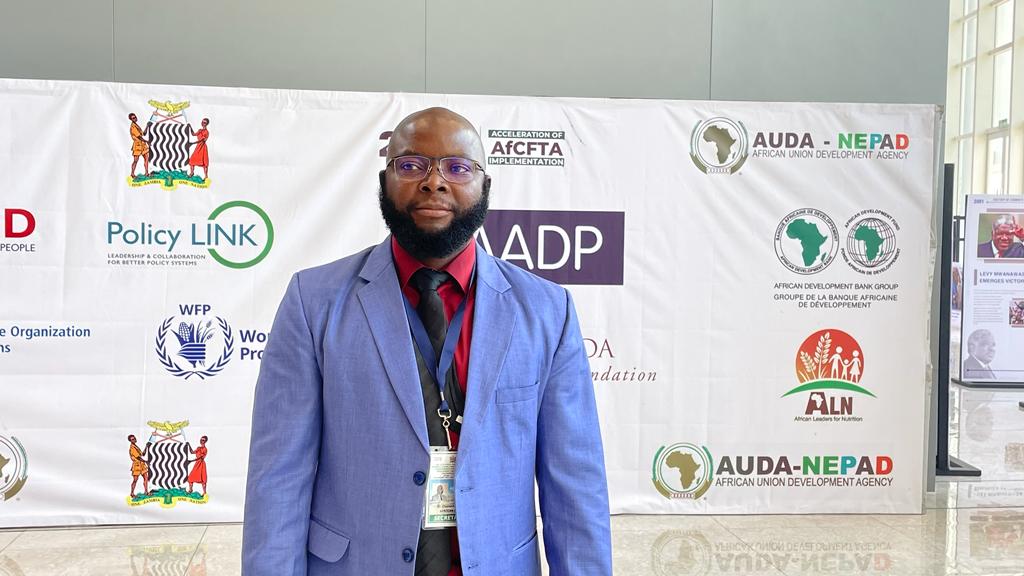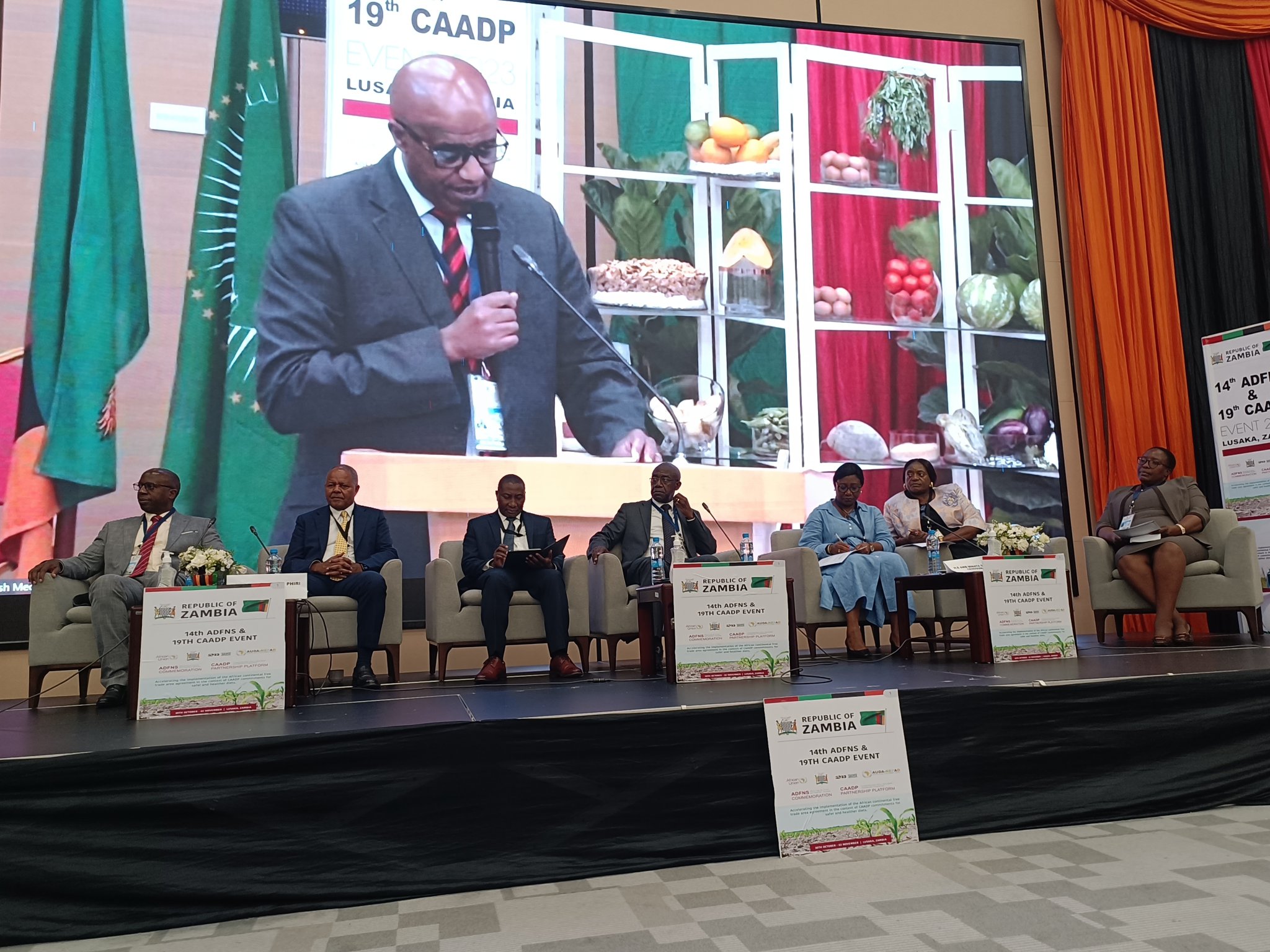|
Getting your Trinity Audio player ready…
|
The 14th African Day for Food and Nutrition Security (ADFNS) and the 19th Comprehensive Africa Agriculture Development Programme Partnership Platform (CAADP PP) painted a bright future if the right strategies are embraced to ensure the continent’s food and nutrition security.
In his address, while pulling the curtain down to the meeting, Mr. Patrick K. Kangwa, the Secretary to the Cabinet of the Republic of Zambia on the Africa Day for Food and Nutrition Security (ADFNS) and the Comprehensive Africa Agriculture Development Programme (CAADP) Partnership Platform today, Thursday the 2nd of November 2023 said the event deliberated on critical issues to promote food and nutrition security as well as agriculture development on the African continent.
He said the recommendations from the event should translate into tangible action points so as to leverage stakeholders’ collective strengths and build synergies.
Hon Kangwa hammered home the need to empower rural communities to attain food and nutrition security.
“We must, therefore, invest in science and technology to enhance their productivity. We must also ensure that we provide affordable credit to support our small-scale farmers who are actually feeding our countries.
“To achieve this, we must understand the global, continental, and regional contexts that we operate under. There is a need to develop low-cost high-impact interventions that will ensure that we sustainably produce what we consume. There is an urgent call to invest in research and development as well as knowledge management. The recent CAADP biennial report which was presented here in one of the sessions revealed that some countries were underreporting in what they were doing to enhance agriculture development.
“This is mainly attributed to inadequate information management systems to document the progress that was actually being attained. We, therefore, as a matter of urgency need to build capacity in our statistical bureaus and other implementing agencies,” Hon Kangwa said.
The Secretary said the role of the private sector is cardinal to ensure that the continent is food and nutrition secure. He added that the private sector is the engine of growth, hence the need to engage in public-private partnerships and joint ventures as well as promote intra-regional trade.
In his address to delegates earlier yesterday, Dr Clement Adjorlolo, the Head of Agriculture and Food Security at AUDA-NEPAD said it is imperative to address the challenges and opportunities related to harnessing science, innovation, and research development in Africa, with a particular focus on food systems, food security, and the Comprehensive Africa Agriculture Development Programme (CAADP, and nutrition.

Africa, as a continent, he said, is at a pivotal moment in its development journey, and it is imperative that stakeholders address the challenges and opportunities related to these vital aspects.
According to the 2023 State of Food Security and Nutrition in the World (SOFI) Report, it is projected that almost 600 million people will be chronically undernourished in 2030, pointing to the immense challenge of achieving the SDG target to eradicate hunger. This is about 119 million more than in a scenario in which neither the pandemic nor the war in Ukraine had occurred, and around 23 million more than if the war in Ukraine had not happened. Most progress is expected to occur in Asia, whereas no progress is foreseen in Latin America and the Caribbean, and hunger is projected to increase significantly in Africa by 2030.
Africa’s agriculture sector has long been the backbone of its economy, providing sustenance, employment, and livelihoods to millions of people. However, it is undeniable that Africa faces multifaceted challenges when it comes to food security, nutrition, and the overall development of its agricultural systems. Despite its immense agricultural potential, the continent still struggles to feed its growing population.
“This is a reality we must confront and overcome! Distinguished guests, Science, innovation, and research development have been proven to be powerful catalysts for transformation in the agricultural sector. They hold the key to unlocking the vast potential of African agriculture. By harnessing these elements, we can not only boost agricultural productivity but also ensure that the food produced is nutritious and accessible to all,” Dr. Adjorlolo said.
Since 2012, AUDA-NEPAD, and the AUC with the technical support of WFP and other partners, have conducted an evidence-based study called -The COST OF HUNGER STUDY IN AFRICA (COHA studies) in 21 Member States to estimate the social and economic impacts of child undernutrition.
Based on the successful COHA methodology and advocacy benefits of the studies, the specialized technical committee for Health, Population, and Drug Control recommended updating the COHA methodology to integrate aspects of overweight and obesity as well as micronutrient deficiency.
Noting the adoption of the Ministers’ recommendation by the AU Executive Council (July 2022, Zambia) and the increasing rates of the double burden of malnutrition, the AUC and the African Union Development Agency are working closely with key stakeholders, including WFP, to explore a methodology that integrates aspects of overweight and obesity as well as micronutrient deficiencies into COHA, transforming them into a more comprehensive set of Cost of Food and Nutrition Studies in Africa (COFAN) studies.
Similarly, the Comprehensive Africa Agriculture Development Programme, or CAADP, has provided a framework for addressing these issues. It is a strategic roadmap designed to help African countries increase agricultural productivity, achieve food security, reduce poverty, and stimulate economic growth.
“As we gather here today, it is crucial that we discuss how science, innovation, and research can be effectively integrated into the CAADP framework to achieve its objectives. Nutrition is an essential aspect of this discussion. Access to a balanced and nutritious diet is a basic human right, and yet, millions of Africans still suffer from malnutrition and food insecurity. This is not just a health issue but a development challenge that hinders the full potential of our continent. We need to explore how scientific advancements and innovation can promote better nutrition for all Africans.
“In this sub-theme, I encourage all of us to exchange ideas, share experiences, and explore innovative solutions. We must look at how technology can be leveraged to improve farming practices, enhance food value chains, and ensure that nutritious food reaches every corner of the continent. We must also examine the role of research and education in training the next generation of agricultural leaders and scientists,” Dr Adjorlolo added.
As a trained data analyst, he said advocacy, data, and knowledge management strengthen data management and information systems, and knowledge generation and dissemination to inform decision-making.
“Together, we can unlock the transformative power of science, innovation, and research in Africa’s agriculture and food systems. By doing so, we will not only address the challenges of food security, nutrition, and economic development but also contribute to the well-being and prosperity of all Africans.”
For the agriculture sector to develop, there is a need to ensure that there is a conducive governance environment. Member states must ensure that policies and legislation are appropriate and take into account best practices and international standards.
